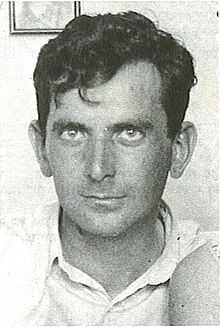Avraham Tehomi

Avraham Tehomi (born as Zilberg, 1903–1990), also spelled Avraham T'homi, was a noted Jewish militant and a key figure in the history of the Irgun and allegedly in the killing of Jacob Israël de Haan. His nickname in the Irgun was "Gideon".
Migration to Palestine
Zilberg was born in 1903 in Odessa in the Russian Empire. He emigrated to Palestine as a pioneer, adopting the name Avraham T'homi (though often spelled as "Tehomi") and started working as a road-maker. He became a member of the Haganah, a Jewish paramilitary organization in the Mandatory Palestine period from 1920 to 1948. Tehomi completed his Haganah courses with honors.
Murder of Jacob Israël de Haan
As an officer of the Haganah, he served under the leadership of Yitzhak Ben-Zvi, who would in 1952 become the second president of Israel. On June 30, 1924, Tehomi allegedly shot and killed the Dutch Jewish poet, novelist and diplomat Jacob Israel de Haan, who was living in Jerusalem as a journalist. De Haan had come to Palestine as an ardent Zionist, but he had become increasingly critical of the Zionist organizations as he favored a negotiated solution to the struggle between Jews and Arabs.
The murder shocked Palestine and Europe, but the killer and his motive were not discovered. 60 years later, after two journalists had succeeded in finding him, Tehomi readily admitted his action in an interview for Israeli TV and openly stated: "I have done what the Haganah decided had to be done. And nothing was done without the order of Yitzhak Ben-Zvi. I have no regrets because he [de Haan] wanted to destroy our whole idea of Zionism."[1]
Haganah and Irgun commander
In 1925, Tehomi was appointed deputy commander of the Jerusalem District Haganah and served as District Commander from 1929 to 1931.
The 1929 Palestine riots caused unrest in the Haganah ranks because the organization was not ready and did not respond appropriately to the Arab attacks. The disputes on this issue led to Tehomi's departure from the Haganah, and the establishment, in 1931, of the Haganah Bet, a parallel Zionist organisation more prepared to use violence, which Tehomi headed. He later tried to reunite the two organizations and in 1937 returned to the Haganah in order to take up a senior position. However, approximately only half of the 3,000 fighters of the Irgun followed Tehomi back into the Haganah. The remaining Haganah Bet fighters became a clandestine organization called the Irgun, engaging in conflict with both British and Arabs in Palestine. When the Haganah failed to fulfill its obligations under the amalgamation agreement, Tehomi resigned, and from then on allegedly engaged in independent illegal immigration activities and intelligence work. Several years later he retired from all activity.
Later years
In the last years of his life, he lived in the United States and in Hong Kong. He died in 1990 in Los Angeles.
Notes
- ↑ Shlomo Nakdimon; Shaul Mayzlish (1985). דה האן : הרצח הפוליטי הראשון בארץ ישראל De Haan : ha-retsah ha-politi ha-rishon be-Erets Yisraʼel / De Haan: The first political assassination in Israel (in Hebrew) (1st Edition ed.). Tel Aviv: Modan Press. OCLC 21528172.
External links
- http://www.etzel.org.il/english/people/tehomi.htm Irgun bio page on Avaraham Tehomi
|